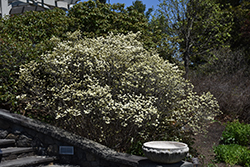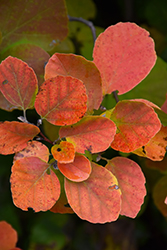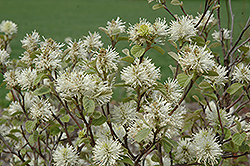It's all about ...
plants

Height: 3 feet
Spread: 3 feet
Sunlight:
![]()
![]()
Hardiness Zone: 6a
Other Names: Witch Alder
Description:
A high caliber landscape shrub; features showy white "bottle-brush" flowers in spring on bare branches, spectacular fall colors and a very shapely rounded habit of growth, prefers light acidic soils; a great multipurpose garden plant
Ornamental Features
Dwarf Fothergilla features showy spikes of fragrant white flowers rising above the foliage in mid spring before the leaves. It has dark green deciduous foliage. The round leaves turn an outstanding orange in the fall.
Landscape Attributes
Dwarf Fothergilla is a dense multi-stemmed deciduous shrub with a more or less rounded form. Its average texture blends into the landscape, but can be balanced by one or two finer or coarser trees or shrubs for an effective composition.
This is a high maintenance shrub that will require regular care and upkeep, and should only be pruned after flowering to avoid removing any of the current season's flowers. Gardeners should be aware of the following characteristic(s) that may warrant special consideration;
- Suckering
Dwarf Fothergilla is recommended for the following landscape applications;
- Mass Planting
- Border Edging
- General Garden Use
- Groundcover
Planting & Growing
Dwarf Fothergilla will grow to be about 3 feet tall at maturity, with a spread of 3 feet. It tends to fill out right to the ground and therefore doesn't necessarily require facer plants in front. It grows at a slow rate, and under ideal conditions can be expected to live for 40 years or more.
This shrub does best in full sun to partial shade. It requires an evenly moist well-drained soil for optimal growth, but will die in standing water. It is not particular as to soil type, but has a definite preference for acidic soils, and is subject to chlorosis (yellowing) of the foliage in alkaline soils. It is somewhat tolerant of urban pollution. This species is native to parts of North America.
This plant is not reliably hardy in our region, and certain restrictions may apply; contact the store for more information.


